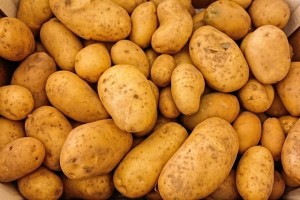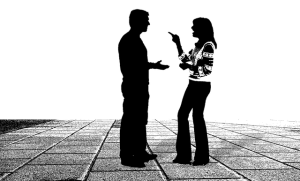potato ![]()
[noun]
[de aard-ap-pel, de aard-ap-pel-en/aard-ap-pels]
 “Aardappel” literally translates to “earth apple”. It’s actually a potato 🙂
“Aardappel” literally translates to “earth apple”. It’s actually a potato 🙂
“Aardappels” play an important role in Dutch cuisine, which is not too ambitious, but quite nutritious by intention. It is inspired by the Dutch fishing and farming history. Nowadays, Dutch cuisine has incorporated many foreign cuisines. For more info, check this article on Wikipedia.
“Aardappel” can also be used when you call somebody names. It’s a mild form of abusive language though 🙂
Examples:
– “Vanavond een lekker Hollands maal: aardappelen en bloemkool met een papje, heerlijk!”
(“Tonight a good Dutch dinner: potatoes and cauliflower with sauce, delicious!”)
– “Ik vind gekookte aardappels niet bijzonder lekker.”
(“I don’t find boiled potatoes particularly tasty.”)
– “Frank is een saaie aardappel, vind je niet?”
(“Frank is a bore head, don’t you think?” Lit.: “…a boring potato…”)
Expressions:
– “Met een hete aardappel in de mond praten / praten alsof je een hete aardappel in de mond hebt”: to speak/talk like a “kakker“: a stuck-up pompous, posh person. Also called “bekakt praten” in Dutch.
Related words:
– Aardappelmesje: little knife for peeling potatoes [noun] [het aardappelmesje, de aardappelmesjes].
– Aarde: earth, ground [noun] [de aarde, de aardes].
– Appel: apple [noun] [de appel, de appels/appelen].
Example:
– “Snoep verstandig, eet een appel!”
(Lit.: “Eat candy wisely, eat an apple!” Used to be a well-known Dutch slogan to promote the consumption of fruit. The verb “snoepen” is the act of eating sweets/candy or other sweet unhealthy food.)
– Dunschiller: (lit.: thin peeler) potato peeler [noun] [de dunschiller, de dunschillers]. Like in the picture!
– Keuken: kitchen [noun] [de keuken, de keukens].
– Koken: to cook, to boil, to prepare dinner [verb] [koken, kookte, h./i. gekookt].
– Schillen: to peel [verb] [schillen, schilde, h./i. geschild].

 “Normaal gesproken” literally translates to “normally spoken”. “Gesproken” is the past participle of the irregular verb “spreken” [sprak, h. gesproken].
“Normaal gesproken” literally translates to “normally spoken”. “Gesproken” is the past participle of the irregular verb “spreken” [sprak, h. gesproken].